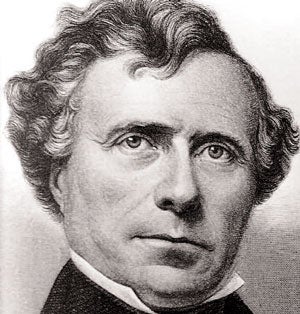
Your support helps us to tell the story
From reproductive rights to climate change to Big Tech, The Independent is on the ground when the story is developing. Whether it's investigating the financials of Elon Musk's pro-Trump PAC or producing our latest documentary, 'The A Word', which shines a light on the American women fighting for reproductive rights, we know how important it is to parse out the facts from the messaging.
At such a critical moment in US history, we need reporters on the ground. Your donation allows us to keep sending journalists to speak to both sides of the story.
The Independent is trusted by Americans across the entire political spectrum. And unlike many other quality news outlets, we choose not to lock Americans out of our reporting and analysis with paywalls. We believe quality journalism should be available to everyone, paid for by those who can afford it.
Your support makes all the difference.
Polls seeking to identify the worst US president of all time usually feature Franklin Pierce in their top five. Nominated by the Democrats as a compromise candidate (on the 49th ballot), he was elected by a landslide against Mexican war hero Winfield Scott. This unexpected success coincided with personal tragedy: his only surviving son (two others had died in infancy) was killed in a train accident two months before his inauguration. His wife, unable to cope with her loss, blamed it on his political ambitions; they were never fully reconciled and she spent much of his term writing letters to her dead children. The strain proved a crucial setback in his lifelong battle with alcohol, and he relied increasingly on the bottle to help him deal with the strains of office.
These proved considerable. An ardent supporter of the rights of individual states, Pierce tried, like his predecessors, to prevent disagreements over slavery from tearing the Union apart. But his best-known piece of legislation had, if anything, the opposite result. The Kansas-Nebraska Act of 1854, which allowed southern slave-owners to take their slaves wherever they wished, effectively overturned the Missouri Compromise of 1820 and opened up the possibility of slavery being expanded into the west. This disastrous measure was prompted by a desire to promote a railroad from Chicago to California through Nebraska. (For similar reasons, relating to a southern railroad, Pierce had already sent James Gadsden to Mexico to purchase the area now comprising southern Arizona and part of southern New Mexico for $10m.)
The provision that, in effect, residents of the new territories could decide the slavery question for themselves resulted in a rush of settlers into Kansas, as southerners and northerners vied for control of the territory. Shooting broke out, and "bleeding Kansas" offered a grim foretaste of the horrors of the Civil War.
As support for the Democrats collapsed, Pierce was further discredited when the contents of the Ostend Manifesto – recommending the acquisition of Cuba, by purchase or by force, from Spain – were leaked. He was not renominated for the 1856 election – "Anybody but Pierce" was the popular slogan when the Democrats were choosing their candidate.
Retirement saw Pierce lapse into alcoholism. His marriage finally collapsed, and his declared support for the Confederacy during the Civil War was the final nail in the coffin of his reputation. He died of cirrhosis in 1869.
In his own words
"There's nothing left but to get drunk." (on losing his party's nomination)
"A Republic without parties is a complete anomaly. The history of all popular governments show how absurd is the idea of their attempting to exist without parties."
In others' words
"Pierce didn't know what was going on, and even if he had he wouldn't have known what to do about it." Harry S Truman
"There are scores of men in the country that seem brighter than he is, but [he] has the directing mind, and will move them about like pawns on a chessboard, and turn all their abilities to better purpose than they themselves could do." Nathaniel Hawthorne
"He was a small politician, of low capacity and mean surroundings, proud to act as the servile tool of men worse than himself but also stronger and abler. He was ever ready to do any work the slavery leaders set him." Theodore Roosevelt
Minutiae
He was the first president to recite his inaugural address from memory.
Pierce was the first president to have a full-time bodyguard, he was once attacked with a hard-boiled egg.
His Vice-President, William Rufus King, died of tuberculosis before he could assume his duties.
He once ran over a pedestrian while driving his carriage in Washington (possibly in a drink-driving incident). He was arrested, but released when his identity became known.
He was a keen fisherman.
He observed the Sabbath so strictly that he refused to open his mail on a Sunday.
Join our commenting forum
Join thought-provoking conversations, follow other Independent readers and see their replies
Comments